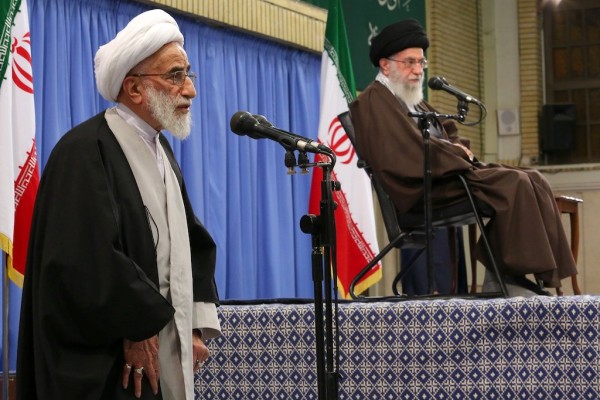PHOTO: Guardian Council head Ayatollah Jannati and the Supreme Leader on Wednesday
UPDATE 1045 GMT: Both President Rouhani and former President Rafsanjani have responded to the Supreme Leader’s challenge with statements against the disqualifications of candidates.
Rafsanjani has told religious scholars from the holy city of Qom that Iranians should be able to choose their representatives from a wide spectrum of views. He warned of consequences if “people’s demands ignored”, saying that they are aware that “censorship does not work”.
Rouhani, who has called for meetings with the Guardian Council to discuss the bans, has refused to concede his position:
Iran president says "it's the people's parliament not a single party parliament. If only one faction, so why to hold election?!"
— Alborz Habibi (@AlborzHabibi) January 21, 2016
The President told the same election officials who heard the Supreme Leader on Wednesday, “We must create hope, enthusiasm, competition….The best deserve entrance to [the Parliament], regardless of their affinity with any special party or person.”
He specifically noted the barring of reformists. Noting that religious minorities are guaranteed seats even when they made up only a fraction of the population, he continued, “Yet there is a faction in this country with seven or 10 million [supporters and few seats].”
Saying that no official is legitimate without the people’s vote, Rouhani ordered two ministers and a Vice-President to negotiate with the Council.
The Supreme Leader has clamped down on February’s elections in Iran, endorsing the disqualification of hundreds and possibly thousands of candidates.
Speaking to election officials, Ayatollah Khamenei declared that while he wanted “those not accepting the system” to vote, they could not “be sent to Majlis”, Iran’s Parliament.
See Iran Feature: Supreme Leader Supports Mass Disqualification of Election Candidates
Khamenei’s line effectively endorsed the campaign of hardliners that their opponents — including “centrists” linked to President Rouhani and reformists — are pursuing “sedition” to undermine the Islamic Republic. It also appeared to block any move by Rouhani, who had said that he would discuss the matter with the Council to solve any “mistake” in the process.
Last weekend, the Guardian Council carried out a mass purge of those hoping to stand for Parliament and the Assembly of Experts, the body which chooses the Supreme Leader. Reports indicated that 60% of candidates were immediately barred.
Of Iran’s current 290 MPs, 50 were reportedly barred from seeking re-election. Only 30 of 3,000 reformists were approved, with others either banned or left in limbo.
Some conservatives were also blocked, including a group linked to Speaker of Parliament Ali Larijani, as was MP Hamid Rasaei, a prominent supporter of former President Mahmoud Ahamadinejad.
More than 12,000 people applied to stand for the 290 seats in Parliament, while more than 800 were seeking a seat on the 88-member Assembly of Experts, the body which chooses the Supreme Leader.
In an interesting — and ironic, given his continued denunciation of the US — tactic, Khamenei used America’s blacklisting of Communists in the 1950s to justify the disqualifications:
There is no place in the world where people who disagree with the principles of that country’s establishment are allowed into the centers of decision-making.
Even in countries like America, which markets itself as a symbol of freedom…people were shoved aside for having the slightest Socialist tendencies during the era of competition between the Eastern and Western blocs.
Bans Unlikely to Be Reversed
The Guardian Council is a 12-member body: six clerics appointed by the Supreme Leader and six legal specialists nominated by the judiciary and confirmed by Parliament.
The Council is seen as carrying out the line preferred by the Supreme Leader’s office. President Rouhani tried last summer to curb the Council’s power, saying it can only “supervise” the conduct of the elections, but he was rebuffed by Khamenei.
See Iran Daily, August 20: Rouhani Challenges Guardian Council Over Next Elections
While the Council has regularly carried out mass disqualifications — such as the ban on former President Hashemi Rafsanjani, who was barred from the 2013 Presidential campaign — this is the largest purge of prominent candidates since the Council began vetting in 1991.
The bans have been widely criticized. Reformists called on the Government to take action. Rafsanjani called the bans “unacceptable” as did Ghorban Ali Dorri Najafabadi, a conservative who heads the Supreme Administrative Court. However, the Supreme Leader’s address on Thursday appears to rule out any reinstatement of candidates.

